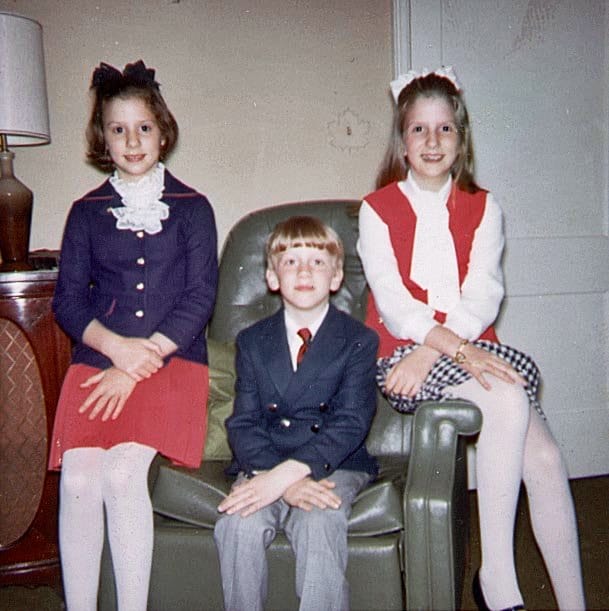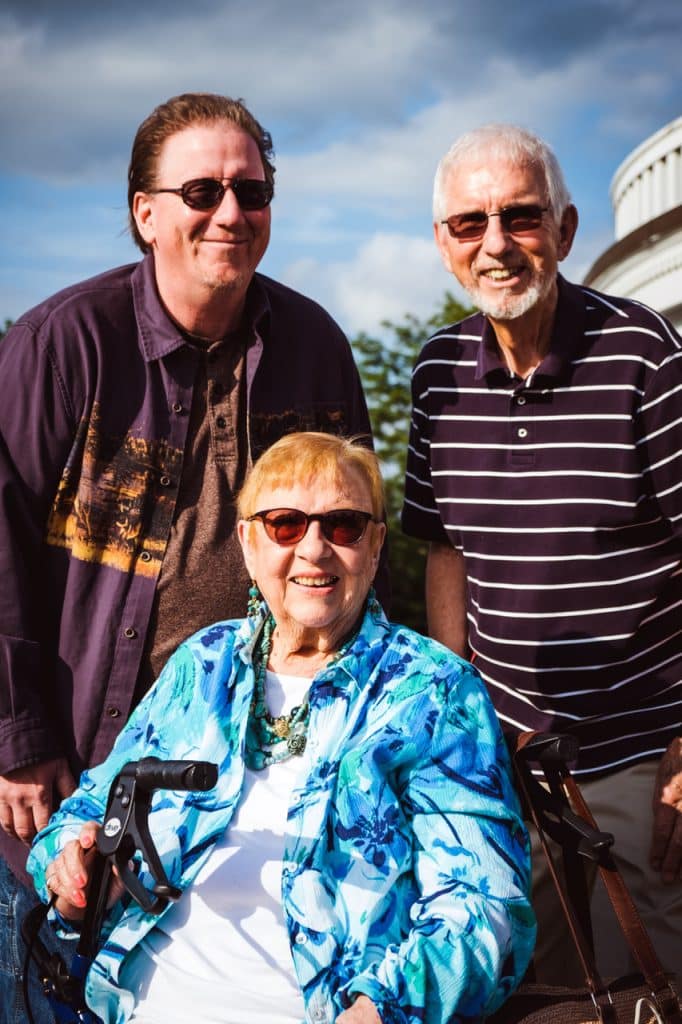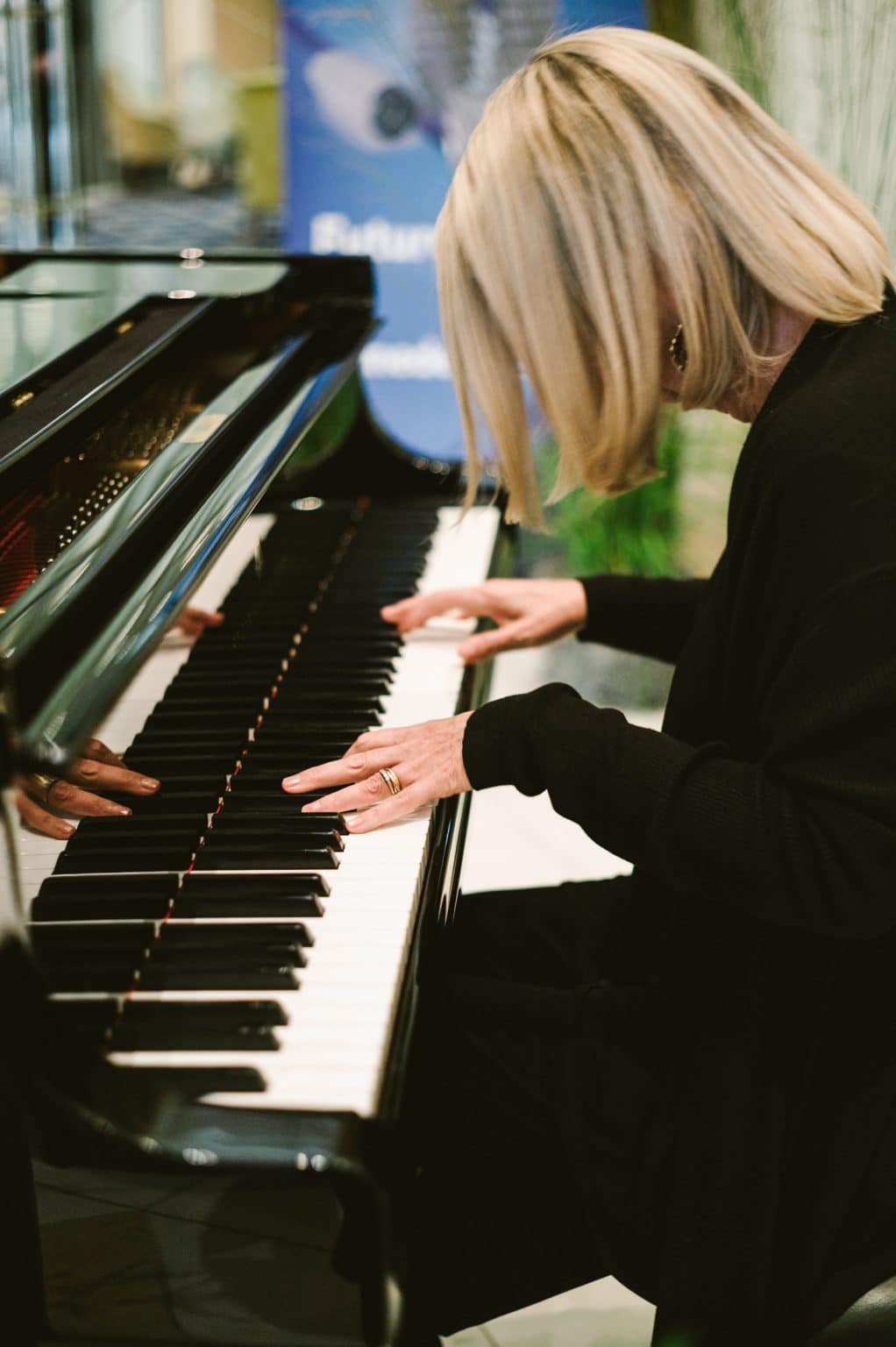
A tribute to my parents, Bob and Ann Rawsthorne, and in loving memory of my brother, Curtis Rawsthorne.
As a child, my brother, Curtis Rawsthorne, liked to chase insects, moths, and butterflies. I have an image of him on a random ridge of state park, sporting a blue swimsuit and giant sneakers, and carrying a large net on a long stick. Pre-pubescent, scrawny-chested, tow-headed, jutting elbows and knees, he stalked his prey—sneaking up on unsuspecting Monarchs, Painted Ladies, and Zebra Longwings. He looked like an insect himself during those years—a nine-year old human, net-toting version of a Praying Mantis, graceful in his awkwardness, laser-focused on his winged victims. During his butterfly years, he mounted a few of them and displayed them on the wall of his tiny bedroom, but most of the time he set them free.
Curtis died of a heart attack on January 20, 2022, three weeks shy of his sixtieth birthday—leaving behind our elderly parents, my sister and myself and our adult children, an aunt who always had his back, a gaggle of cool cousins, and a group of work colleagues and friends who will miss him very much. Curtis was particularly close to my sister’s boys, the oldest of whom, Beau, found his body.
Curtis Rawsthorne had a vast amount of potential as a child—he accomplished many tricky things with a lot of style. He might have become a biologist, a drummer, a stand-up comedian, a motorcycle mechanic, or the Mayor of Pittsburgh. He might have morphed into a park ranger, a race car driver, a teacher, or writer of nature books. Instead, he became a baseball player. He was a talented pitcher who won almost every game he threw, using, I assume, that same single-mindedness and prowess that once guided his butterfly hobby. With his stellar record, he quickly became the fast-ball junk-throwing hero of the Little League Association in our community.
My sister, Randy, and I logged hundreds of hours sitting on rickety benches at dusty ballfields watching Curtis pitch and listening to my mom yell at the umpire whenever he missed a strike call. Curtis climbed the ladder of Little League hierarchy, and the stakes grew with each game. No one cares much when you lose, but when you start to win, things change. Scouts, college coaches, and decision makers began to show up to watch him. The crowds grew more serious, the trash talk became harsher. I felt sorry for him in those days, even though he was winning. He was a sensitive boy in a brutally competitive field. At the time, I was a budding musician dealing with recitals and performances, so I knew about the perils of pressure and competition. He seemed to handle it better than I did. Or so I thought.
Curtis’s use of recreational drugs and alcohol probably started in high school. We attended the same Pittsburgh public school during the seventies, and drugs were rampant and largely ignored by most teachers and administrators. Kids will be kids, weed was weed, and alcohol was the “adult” drug that was both socially acceptable and almost legal for those barreling towards their twenty-first birthdays. The grown-ups around us drank, so why shouldn’t we—in our adolescent efforts to take adulthood by storm—also partake? Most of us dabbled with drugs (I count alcohol as a drug) and then pivoted back to the safety of our studies, our hobbies, our teenage romances. But my brother’s drug experimentation grabbed him in a different way.
Back when Curtis was strong and innocent and still wearing the daisy-chain crown of youthful promise, my dad worked endlessly with him on his pitching skills at the grassy field close to our house. I suspect Curtis’s 10,000 hours of throwing were logged well before his twelfth birthday. After his tumultuous and spectacular high school years, Curtis was accepted to Florida Southern College and off he went to baseball land. In some ways, he never returned. During his time there—maybe from constant athletic stress, loneliness, depression, or a simple teenage desire to party with his university friends, my talented little brother became officially ensnared in the bear trap of seventies/eighties drug culture.
After graduating from college and a couple of failed try-outs in the major leagues, Curtis’s struggle put him on a wearisome circular path from which he could never really break free, causing my parents and everyone else who loved him decades of anguish. We had plenty of compassion and love for him—we even had plenty of cautious optimism during his many brave phases of recovery and sobriety—but the disease, it seemed, kept him from finding the right combination of compassion and love for himself.
I think back forty years, put myself in my parents’ shoes, and cry. Like most parents of college-bound kids, my folks sent their child away to follow a dream, with good intentions and elevated, but realistic, hopes for launching his life, knowing they had done their best to raise a decent human being while nurturing his natural talent. Instead, they watched helplessly as the claws of chemical imbalance begin to scratch away at the foundation of everything they had built together. I can’t imagine anything worse.
Here’s something worth knowing: My brother, sister, and I had great parents—strict enough, engaged, funny, and loving. They showed up every single time one of us had a triumph, a failure, an emotional breakdown, a divorce, a baby, a serious illness, a victory, an overdose. Over the decades they’ve given all three of their kids enough second, third, and eighteenth chances to fill a forgiveness basket the size of a concert hall, a baseball stadium, an open sky. If you had to define “unconditional love” for an unenlightened audience of orphans, Mom and Dad would be the poster parents.
Addiction is something like metastatic cancer, a disease with which I’m familiar. Once it takes hold, it never goes away; it sits alert, a stealth nemesis ready to ooze into any defenseless empty space. With both metastatic cancer and addiction, the best one can hope for is a long period of remission, but proper choices must be made to kick that remission into start mode and maintain its fragile presence. But here’s the depressing part: even when informed decisions have been made, the disease can still come out of nowhere and broadside its victim and his family. It seems random and cruel and sad.
We can grow impatient and angry with the disease itself, but still love Curtis. He was more than his illness. So much more. My nephews will tell you that no one made them laugh harder; my father will spend the rest of his life remembering the love they shared for the great outdoors; my mother will always acknowledge his kindness and sensitivity.
Remission—or recovery—is the weedy garden where hope grows. Hope kept my parents believing in my brother, even when he didn’t believe in himself. Hope washed over them each of the many times he walked out of rehab, seemingly himself again, funny and curious, vocal about politics, loving and dedicated to healing himself and protecting his family.
I’m not talking out of school here: Curtis was honest about his addiction and willing to share his history with anyone who took the time to listen. In another version of his life—the one with the happier ending—he might have excelled as a counselor for other people in recovery.
Some bad things happened over my brother’s four-decade juggle with survival—some of them almost funny in their awfulness, some of them truly horrific—but my family is now choosing to honor the memory of how he started out in life, his unfulfilled potential, his daily struggle to do the right thing. We choose to celebrate the times when he regained his courage, humor, and concern for the world around him. Even in his darkest moments, he recognized the love surrounding him. He may have died alone in his sleep—forty years of abuse had worn out his broken heart—but he knew he was loved. And that’s no small thing.
I’ve spent my entire adult life fearful he would die before my parents and now it has happened. Years ago, that fear caused a lot of bitterness on my part—rage at him for crushing my parents with worry, but also low-grade anger at my parents for continuing to support him on his revolving door journey through the gates of hell. The resentment diminished once I had my own teenagers and realized that I would do anything—anything—for my kids, just like my parents did everything for their son. They stood by him, my god, they stood by him. Mainly, they loved him.
My parents are coping as best they can—remembering wonderful and shiny things about their lost son while wading through the emotional sludge of death. In their exhausted eyes he’s still the kid with the fishing rod, the parade drum, the baseball glove. The kid who threw fast balls and knocked down so many milk cans at the amusement park pitching game that he was banned from playing because they ran out of prizes; the boy with shoulder-length hair who slid into home in a cloud of dust with determined eyes and a crooked grin a mile wide.
Our recollections of him must no longer be clouded by his disease or our perception of it. We can choose our memories, so we do.
Boy. Net. Butterfly. Free.

Robin Meloy Goldsby is a Steinway Artist and popular solo piano streaming artist. She is the author of Piano Girl; Waltz of the Asparagus People: The Further Adventures of Piano Girl; Rhythm: A Novel and Manhattan Road Trip. New from Backbeat Books: Piano Girl Playbook: Notes on a Musical Life
New music from Robin Goldsby: Living Room, Volume 1
